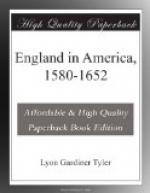The famous Toleration Act of 1649 was passed at the first assembly succeeding Stone’s appointment. It was very probably in great part a copy of a bill in the code of sixteen laws which Baltimore sent over at this time, and it very nearly repeated the provisions of the oath required of Governor Stone. While the terms of the act did not place the right on that broad plane of universal principle stated later in the Virginia Declaration of Rights, it proclaimed toleration, even if it was a toleration of a very limited nature.[27]
Stone had recommended himself to Calvert by promising to lead five hundred persons of British or Irish descent[28] into Maryland; and this engagement he was soon able to perform through the Puritans, whose story of persecution in Virginia has been already related. The new emigrants called the country where they settled “Providence,” from feelings akin to those which led Roger Williams to give that comforting name to his settlement on Narragansett Bay. They were to prove a thorn in Baltimore’s flesh, but for the moment they seemed tolerably submissive. In January, 1650, soon after their arrival, Governor Stone called an assembly to meet at St. Mary’s in April, and to this assembly the colony at “Providence” sent two representatives, one of whom was made speaker.
Apprehension of William Claiborne was still felt, and the assembly, though dominated by the new-comers, declared their readiness to resist any attempts of his to seize Kent Island.[29] Only in one particular at this time did they oppose Lord Baltimore’s policy. The oath of fidelity required them to acknowledge Lord Baltimore as “absolute lord” and his jurisdiction as “royal jurisdiction."[30] The Puritans, having scruples about these words, struck them out and inserted a proviso that the oath “be not in any wise understood to infringe or prejudice liberty of conscience."[31] About this time Charles II., although a powerless exile, issued an order deposing Baltimore from his government and appointing Sir William Davenant as his successor, for the reason that Baltimore “did visibly adhere to the rebels in England and admit all kinds of schismatics and sectaries and ill-affected persons into the plantation."[32]
Thus when Parliament soon after took up his case again, Lord Baltimore came full-handed with proofs of loyalty to the commonwealth. His enemies produced evidence that Charles II., in 1649, was proclaimed in Maryland, but Baltimore showed that it was done without his authority by Thomas Greene, who acted as governor a second time during a brief absence of Captain Stone from Maryland. When they accused him of being an enemy of Protestants he produced the proclamation of Charles II., deposing him from the government on account of his adherence to them. Finally, he exhibited a declaration in his behalf signed by many of the Puritan emigrants from Virginia, among whom were William Durand, their elder, and James Cox and Samuel Puddington, the two burgesses from Providence in the assembly of 1650.[33]




